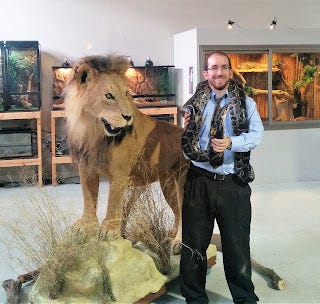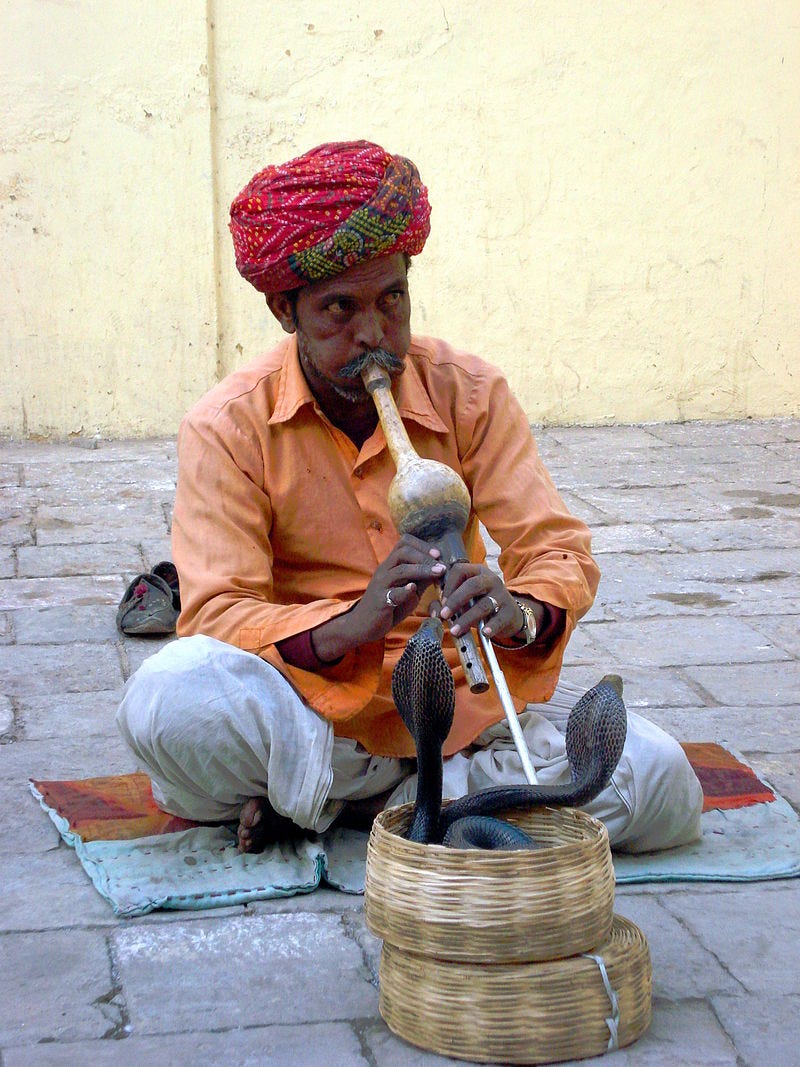Beast Masters and Snake Charmers
I've been accused of various sins, but recently I was accused of something that was not only a novelty for me - it's a sin that I've never heard anyone being accused of!

The charge from a museum visitor was that I am guilty of "chover chaver." That's a curious prohibition, mentioned in Devarim 18:11. Rashi defines it as "someone who gathers snakes or scorpions or other wild animals into one place." I do all three - QED!
Of course, creating a zoo or a Biblical Museum of Natural History is not what the Torah is talking about. As the context of the verse makes abundantly clear, it's talking about gathering these animals via incantations. It's not referring to purchasing them from breeders!
Now, as with all prohibitions relating to the apparently supernatural, the meaning of this is subject to the famous medieval dispute between rationalists and mystics. Rambam, representing the rationalist approach, stated emphatically that there is no such thing as magic, and that the Torah prohibits these things because they are folly. The mystical approach, on the other hand, maintains that these practices work, but they are forbidden.
With either approach, it is a little difficult to understand exactly why this is prohibited. What's so terrible about someone controlling animal behavior, or even mistakenly believing/ fooling people into thinking that he can? It is said that King Shlomo "knew the language of the animals" - didn't he ever tell them to do anything? It seems that a precise understanding of the nature of this practice has been lost in the mists of history.

While researching this topic, I came across something intriguing. Rambam, in his commentary to Avos 2:10, discusses how wise men reject the efforts of those who try to falsely ingratiate themselves with them. He says, "They will not listen to the voice of a charmer, like the seraf (a type of snake) does not listen to it, as it stated (Psalms 58:6), "Which does not hear the voice of charmers."
But is the verse saying that this snake cannot be charmed? If we look at the full context of the verse, it states as follows:
"The wicked have been corrupt since birth; liars from the womb, they have gone astray. Their venom is like the venom of a snake, like that of a serpent stopping its ears, so as not to hear the voice of the charmer, or the enchanter with cunning spells."
The verses are not saying that snakes in general cannot be charmed; they are speaking about how the wicked are like a figurative snake which has its ears stopped up, and therefore cannot be charmed. But Rambam seems to be quoting the verse as saying that a snake cannot be charmed. Did he somehow read these verses that way? Or was he simply short-handedly referring to a snake which has its ears stopped up?
I'm wondering if Rambam was of the view that snake-charming is like chover chever - a deceptive practice that does not actually work. In fact, contemporary science says that it is only partially deceptive. The snake does not actually hear the sound of the instrument, since it lacks an outer ear, though it does perhaps sense the vibrations of the sound. Still, the key to what is happening is the movement of the charmer. He is not hypnotizing the snake, per se; rather, he encouraging it to follow certain patterns of natural behavior when faced with a threat - in this case, the instrument.
(As to how to explain the verses, which imply that snakes are charmed by the sounds that they hear, that would simply be another case of "the Torah speaking in the language of man.")


